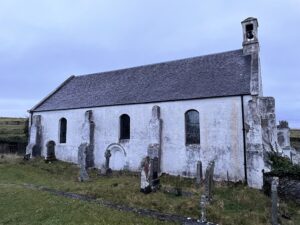
Image: The churchyard of Lismore’s Church of Scotland kirk (and late medieval cathedral) where Dugald MacNicol’s father, Rev. Donald MacNicol (1735–1802) was minister for many years. Rev. Donald MacNicol is buried along with Dugald’s mother, Lillias, and a number of his siblings in the churchyard.
About the project
In 1810, a young Dugald MacNicol (1791-1844) set sail from Glasgow headed with his regiment for the Caribbean island of Barbados. Born on the Inner Hebridean Gaelic-speaking island of Lismore, Dugald MacNicol was one of many contemporary Scottish Gaels who would travel to the West Indies as participants in the British imperial enterprise. Almost invariably, these Scots were implicated – in a variety of ways – in the inhumane trade in enslaved Africans.
Although born on Lismore where his father, Rev. Donald MacNicol (1735-1802), was Church of Scotland minister, Dugald MacNicol spent much of his young life after his father’s death shuttling between relations in Inveraray, Glenorchy and Greenock. Shortly after receiving his commission in the British Army in his late teens, MacNicol left for Barbados where he would spend most of the rest of his life, forming a life-long union with Johanna Franklin, a free woman of colour with whom he had at least seven children.
Uniquely, MacNicol left a manuscript account of his early travels written in Gaelic, as well as a number of Gaelic òrain (songs) composed in both his native Argyll and in the Caribbean. This AHRC-project will edit these unique Gaelic writings from the original manuscripts in the National Library of Scotland, setting them in dialogue with biographical details of MacNicol’s later life and the broader position of Scottish Gaels and their role in the British Caribbean of the eighteenth and nineteenth centuries.
